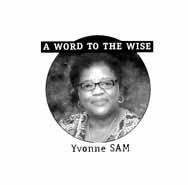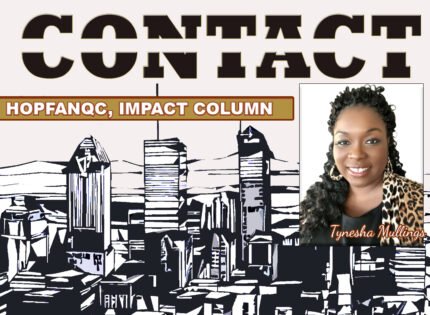It is not so much about Black History as it is about history influenced by Blacks.
February is here.  It heralds another Black History Month, along with the connotation of being the shortest month of the year.
It heralds another Black History Month, along with the connotation of being the shortest month of the year.
Nevertheless, permit me to make an open confession. The very term Black History wreaks havoc on my psyche; I cringe every time February rolls around because for me the month has predictable defenses. It has become little more than a tool for liberal academics to perpetuate revisionist history that suits their agenda, the sudden emergence of a seeming newfound appetite for anything about Black history during these magical 28 days, and a marginalized people’s history being given prominence in the mainstream.
On February 1, Linton Garner and Dr. Dorothy Williams, under the auspices of Mc Gill University (my alma mater) hosted the launch of the ABCs of Canadian Black History Kit: A Journey of Discovery into Canadian History. It was touted as an innovative educational tool, which can be used to inform students of all ages about the contributions of Blacks to the development of Canada from sea to sea.
According to one of the innovators, the kit was produced in response to the longing within the Black community for the introduction of a pedagogical application into the school curriculum integrating the contributions of Blacks in Canada’s historical timeline.
Really! Really! How great the longing! Such a statement only serves to depict the lethargy that existed in the community. It may be of sound interest to ascertain the population of interest that triggered this study. Where have we been all this time…?
Incidentally and ironically, in Montreal, in 1993, a similar situation along with expressed sentiments and scenario arose. Many groups questioned the absence of Blacks and the Black perspective from the school curricula. This complaint reached the ears of the Ministere de l’education du Quebec, which recognized the need and acted to introduce the relevant materials. Collaborating with the Government on this project were the Quebec Board of Black Educators (of which I was a member), and the Provincial Association of Social Studies.
Entitled Some Missing Pages, the project came to fruition and was organized into eight units spanning the periods in Quebec and Canadian history from the French Regime to the postwar decades of the twentieth century. The material was directly compatible with the History of Quebec and Canada program (History 414), and many of the items included in the pages served as valuable content relative to a variety of subject areas and grade levels.
Now we have two kits and zero hits. Whatever happened to SOME MISSING PAGES? Did the latest discoverers know about the existence of a similar educational tool? In the new kit what inclusion/exclusion/conclusion is arrived at? Was the Quebec Ministry of Education contacted and communication begun with regards to progress or evaluation following the inclusion in the school curriculum of some 22 years previously? Who knows what or plain diddlysquat? Is this not a blatant example of a piece of our history once more being cast into oblivion? When will we ever learn?
Another concern that needs to be addressed and to which an answer should be demanded is this: “What (if anything) is taught in schools regarding Blacks and their contributions, in the period from March 1, of any given year to January 31 of the next? At the close of every Black History Month, are those of a pedagogical leaning waiting until the following year to teach or to share the history of Blacks in Canada with students in the educational system, or is there yearlong dissemination? What message do we send when February comes to an end?
Sit still with your seat belts still fastened, while I fast-forward to 1995 where a poll conducted by the Canadian Civil Liberties Association found that 83% of Canadians did not know that slavery had been practiced in pre-Confederation Canada. Canadians were abysmally ignorant of their history.
The first recorded person of African heritage to set foot in what would become Canada arrived over 510 years ago. Mathieu Da Costa arrived on our shores in 1604; he was an interpreter to the Micmac nation and later became Governor of Acadia in 1608. Next, in 1734 there were roughly 1,200 slaves in New France, the year Montreal slave Marie-Joseph Angélique torched her master’s home in her bid to escape being sold to a Quebec government official for 600 pounds of gunpowder.
In my humble opinion we need to redefine Canadian History. Assemble the bits into the kits; Black History is Canadian History.
The role of Black Canadians in Canadian history has been so integral that instead of asking: “How have Blacks influenced Canadian history we should ask: In what ways have Blacks not influenced Canadian history?
Time marches on and has marched on; yet here we are still struggling for inclusion after the transfusion. There is much more history to examine pertaining to Black Canadians and viewing it only through the prism of Black History can be part of the problem, as it should always be seen as part of the larger Canadian context. It is not so much about Black History as it is about history influenced by Blacks.
When the contributions of people of African descent are acknowledged, when the achievements of Black people are known, when Black people are routinely included or affirmed through our curriculum, our books, the government and the media, and treated with equality, then there will no longer be a need for Black History Month, or at best a learning kit. Our minds will always remain alit.
In the face of the displayed vitality of Black History Month, the current rendering of Black folk’s role in Canadian history ignores the centrality of the black experience to the Canadian experience.
Aleuta— The struggle continues.














